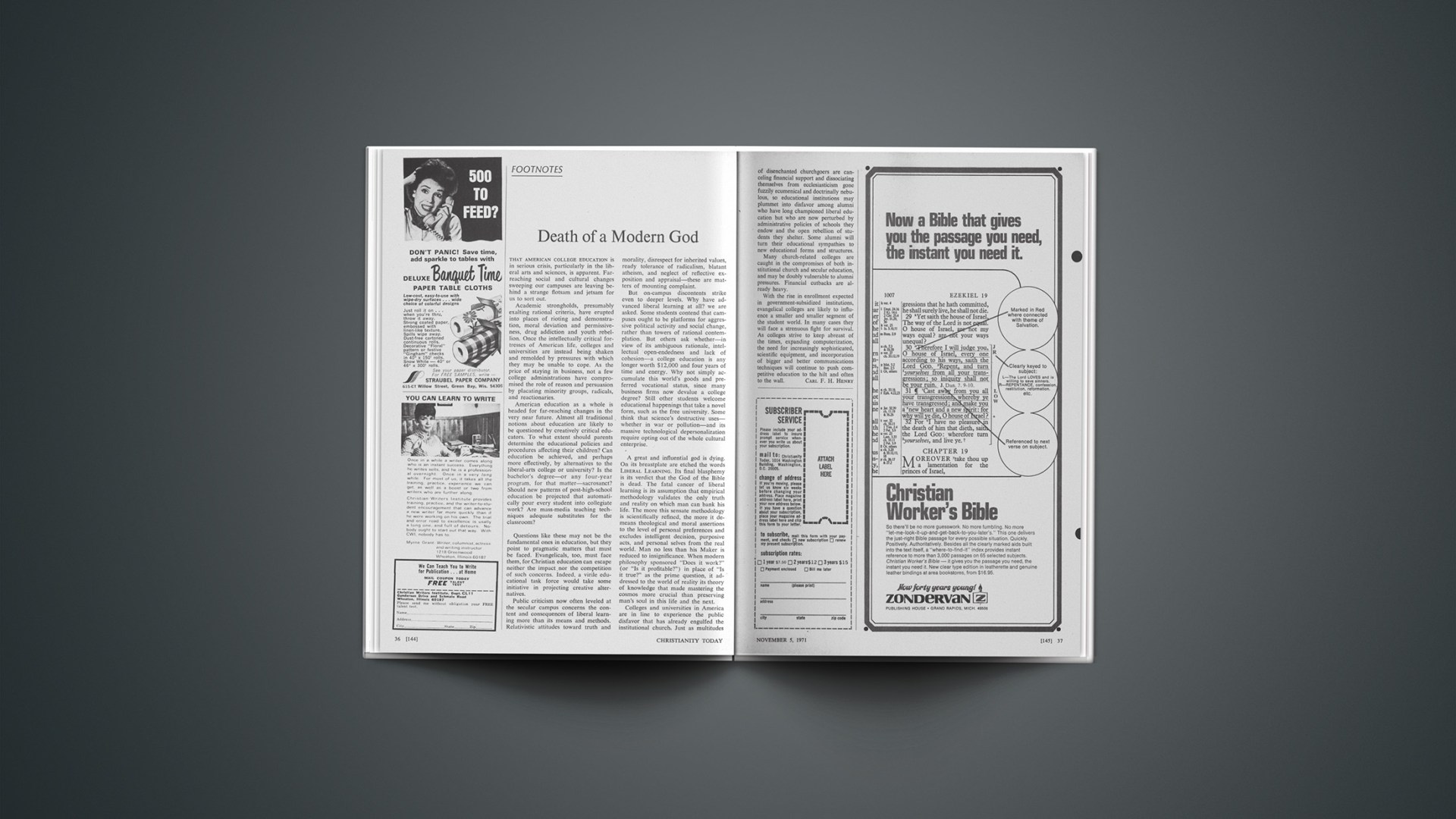That american college education is in serious crisis, particularly in the liberal arts and sciences, is apparent. Far-reaching social and cultural changes sweeping our campuses are leaving behind a strange flotsam and jetsam for us to sort out.
Academic strongholds, presumably exalting rational criteria, have erupted into places of rioting and demonstration, moral deviation and permissiveness, drug addiction and youth rebellion. Once the intellectually critical fortresses of American life, colleges and universities are instead being shaken and remolded by pressures with which they may be unable to cope. As the price of staying in business, not a few college administrations have compromised the role of reason and persuasion by placating minority groups, radicals, and reactionaries.
American education as a whole is headed for far-reaching changes in the very near future. Almost all traditional notions about education are likely to be questioned by creatively critical educators. To what extent should parents determine the educational policies and procedures affecting their children? Can education be achieved, and perhaps more effectively, by alternatives to the liberal-arts college or university? Is the bachelor’s degree—or any four-year program, for that matter—sacrosanct? Should new patterns of post-high-school education be projected that automatically pour every student into collegiate work? Are mass-media teaching techniques adequate substitutes for the classroom?
Questions like these may not be the fundamental ones in education, but they point to pragmatic matters that must be faced. Evangelicals, too, must face them, for Christian education can escape neither the impact nor the competition of such concerns. Indeed, a virile educational task force would take some initiative in projecting creative alternatives.
Public criticism now often leveled at the secular campus concerns the content and consequences of liberal learning more than its means and methods. Relativistic attitudes toward truth and morality, disrespect for inherited values, ready tolerance of radicalism, blatant atheism, and neglect of reflective exposition and appraisal—these are matters of mounting complaint.
But on-campus discontents strike even to deeper levels. Why have advanced liberal learning at all? we are asked. Some students contend that campuses ought to be platforms for aggressive political activity and social change, rather than towers of rational contemplation. But others ask whether—in view of its ambiguous rationale, intellectual open-endedness and lack of cohesion—a college education is any longer worth $12,000 and four years of time and energy. Why not simply accumulate this world’s goods and preferred vocational status, since many business firms now devalue a college degree? Still other students welcome educational happenings that take a novel form, such as the free university. Some think that science’s destructive uses—whether in war or pollution—and its massive technological depersonalization require opting out of the whole cultural enterprise.
A great and influential god is dying. On its breastplate are etched the words LIBERAL LEARNING. Its final blasphemy is its verdict that the God of the Bible is dead. The fatal cancer of liberal learning is its assumption that empirical methodology validates the only truth and reality on which man can bank his life. The more this sensate methodology is scientifically refined, the more it demeans theological and moral assertions to the level of personal preferences and excludes intelligent decision, purposive acts, and personal selves from the real world. Man no less than his Maker is reduced to insignificance. When modern philosophy sponsored “Does it work?” (or “Is it profitable?”) in place of “Is it true?” as the prime question, it addressed to the world of reality its theory of knowledge that made mastering the cosmos more crucial than preserving man’s soul in this life and the next.
Colleges and universities in America are in line to experience the public disfavor that has already engulfed the institutional church. Just as multitudes of disenchanted churchgoers are canceling financial support and dissociating themselves from ecclesiasticism gone fuzzily ecumenical and doctrinally nebulous, so educational institutions may plummet into disfavor among alumni who have long championed liberal education but who are now perturbed by administrative policies of schools they endow and the open rebellion of students they shelter. Some alumni will turn their educational sympathies to new educational forms and structures.
Many church-related colleges are caught in the compromises of both institutional church and secular education, and may be doubly vulnerable to alumni pressures. Financial cutbacks are already heavy.
With the rise in enrollment expected in government-subsidized institutions, evangelical colleges are likely to influence a smaller and smaller segment of the student world. In many cases they will face a strenuous fight for survival. As colleges strive to keep abreast of the times, expanding computerization, the need for increasingly sophisticated, scientific equipment, and incorporation of bigger and better communications techniques will continue to push competitive education to the hilt and often to the wall.
CARL F. H. HENRY










